
Senecio is a genus of the daisy family (Asteraceae) that includes ragworts and groundsels. The scientific Latin genus name, Senecio, means "old man."
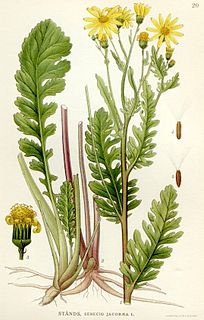
Jacobaea vulgaris, syn. Senecio jacobaea, is a very common wild flower in the family Asteraceae that is native to northern Eurasia, usually in dry, open places, and has also been widely distributed as a weed elsewhere.

Friedrich Richard Rudolf Schlechter was a German taxonomist, botanist, and author of several works on orchids.

Senecioneae is the largest tribe of the Asteraceae, or the sunflower family, comprising about 150 genera and 3,000 species. Almost one-third of the species in this tribe are placed in the genus Senecio. Its members exhibit probably the widest possible range of form to be found in the entire plant kingdom, and include annuals, minute creeping alpines, perennial herbs, shrubs, climbers, succulents, trees, and semiaquatic plants.

Johann Heinrich Friedrich Link was a German naturalist and botanist. The standard author abbreviation Link is used to indicate this person as the author when citing a botanical name.

Carl Ludwig Willdenow was a German botanist, pharmacist, and plant taxonomist. He is considered one of the founders of phytogeography, the study of the geographic distribution of plants. Willdenow was also a mentor of Alexander von Humboldt, one of the earliest and best known phytogeographers. He also influenced Christian Konrad Sprengel, who pioneered the study of plant pollination and floral biology.
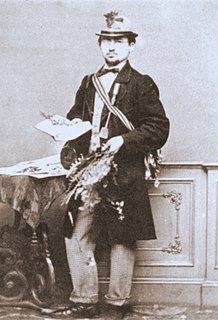
Carl Ernst Otto Kuntze was a German botanist.

Jacobaea maritima, commonly known as silver ragwort, is a perennial plant species in the genus Jacobaea in the family Asteraceae, native to the Mediterranean region. It was formerly placed in the genus Senecio, and is still widely referred to as Senecio cineraria; see the list of synonyms (right) for other names.
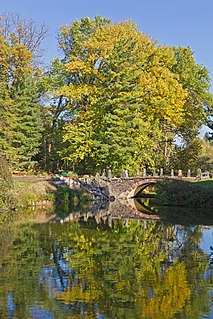
The Berlin Botanic Garden and Botanical Museum is a botanical garden in the German capital city of Berlin, with an area of 43 hectares and around 22,000 different plant species. It was constructed between 1897 and 1910, under the guidance of architect Adolf Engler, in order to present exotic plants returned from German colonies.

Jacobaea is a genus of flowering plants in the tribe Senecioneae and the family Asteraceae. Its members used to be placed in the genus Senecio, but have been separated into the segregate genus Jacobaea on the basis of molecular phylogenetics in order to maintain genera that are monophyletic. The following species are recognised by The Plant List:

The Jardim Botânico Nacional Grandvaux Barbosa is the only botanical garden in Cape Verde. The garden is located in São Jorge, in the middle of the island Santiago. Its collection focuses on endemic and native plants of Cape Verde.
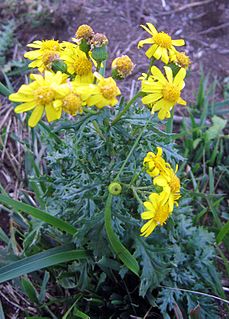
Senecio squalidus, known as Oxford ragwort, is a flowering plant in the daisy family Asteraceae. It is a yellow-flowered herbaceous plant, native to mountainous, rocky or volcanic areas, that has managed to find other homes on man-made and natural piles of rocks, war-ruined neighborhoods and even on stone walls. These habitats resemble its well drained natural rocky homeland. The plants have spread via the wind, rail and the activities of botanists. The travels of this short-lived perennial, biennial, or winter annual make it a good subject for studies of the evolution and ecology of flowering plants.

Lichterfelde is a locality in the borough of Steglitz-Zehlendorf in Berlin, Germany. Until 2001 it was part of the former borough of Steglitz, along with Steglitz and Lankwitz.

Jacobaea erucifolia, the hoary ragwort, is a species of the genus Jacobaea and the family Asteraceae.

Jacobaea gibbosa is a species of the genus Jacobaea and the family Asteraceae.

Jacobaea paludosa, syn. Senecio paludosus, the fen ragwort, is a species of the genus Jacobaea and the family Asteraceae that can be found in Northern Italy, and everywhere in Europe.

Pieter B. Pelser is a Lecturer in Plant Systematics and the curator of the herbarium at the University of Canterbury in Christchurch, New Zealand. One research interest is the evolutionary history of the tribe Senecioneae, one of the largest tribes in the largest family of flowering plants. He wrote the most recent attempt to define and delimit this tribe and its problematic founding species Senecio. He also studies insects that eat these plants (Longitarsus) which contain pyrrolizidine alkaloids and what makes them choose which plants they eat.

Inula salicina is a plant species in the genus Inula in the family Asteraceae. It is found across Europe and Asia from Portugal to Japan. It has been reported growing in the wild in a few scattered locations in North America but it has not become widely established there.
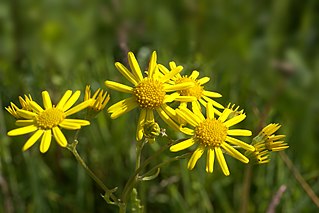
Jacobaea aquatica or Senecio aquaticus, the water ragwort or marsh ragwort, is a plant of the family Asteraceae. It is a perennial or biennial plant: young plants form a rosette near the ground, eventually producing a taller flowering shoot with many bright yellow flower heads, each with prominent ray florets. It grows in damp, grazed grassland, especially where there has been some disturbance.



















